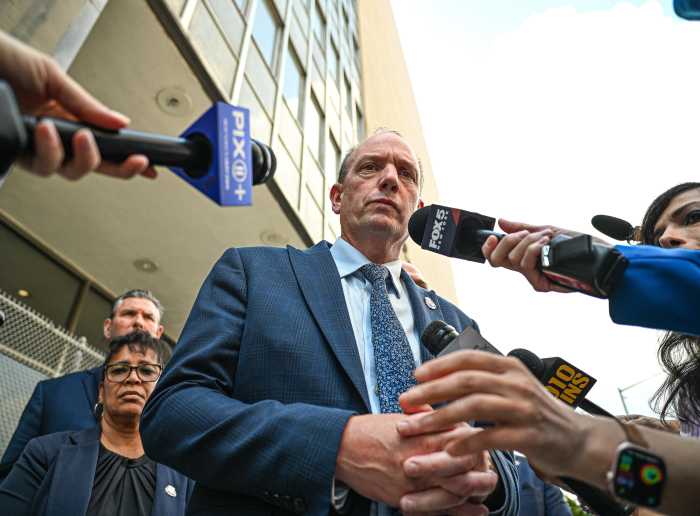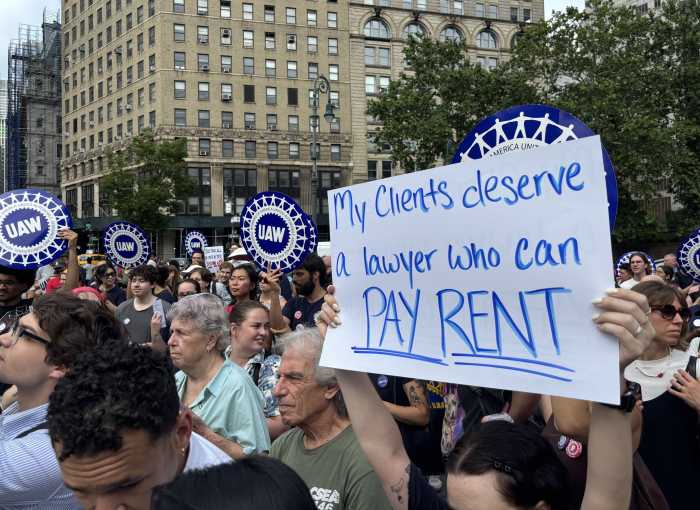
BY CYNTHIA MAGNUS | “We are daring our kids and our principals to function like this,” said Tricia Joyce, Community Board 1 member, and Co-Chair of the P.S. 234 Committee on Overcrowding. Joyce’s dare was delivered at a June 23 meeting at the offices of Assembly Speaker Sheldon Silver.
Elizabeth Rose, director of portfolio planning for the City Department of Education (D.O.E.) presented updates on the new elementary school at Peck Slip projected to open in Fall 2015, and on the current wait-list situation at P.S. 234 for Fall 2011 admissions.
The City plans to finalize the acquisition of the Peck Slip Post Office this fall, followed by the start of the design process for the new school. Being planned as a K-5 general education school, said Rose, it will also serve local students who need Collaborative Team Teaching and Special Education, but the site “will be a one-organization building.”
The issue of overcrowded schools in neighborhoods that Downtown parents say the city made efforts to attract growing families to over the past decade remains a contentious one. On one side, are the advocates and local parents who may be forced to split siblings between distant schools, and on the other, is the city administration, which Ms. Rose labeled “capital constrained.”
Speaker Silver’s district director Paul Goldstein reminded the D.O.E. that, “It is precisely the excellent schools in Lower Manhattan that have contributed so much toward the attractiveness of this community.
“If you’re going to take that away from this emerging, still growing community I think you’re going to do some harm in the long run,” he said.
Twenty-one children are currently on the P.S. 234 wait-list, and all would be required by the D.O.E. to attend P.S. 130 on Baxter Street beginning Fall 2011. That solution is problematic, according to parent advocates, who say that in addition to the burden of travel for young children and the loss of social opportunities with neighborhood peers attending P.S. 234, the plan would place P.S. 234 kindergarteners ahead of the siblings of current P.S. 130 students, a solution parents at both schools find unfair.
There are several alternatives that stakeholders want the D.O.E. to consider. One, supported by Assemblymember Deborah Glick, is to have each kindergarten section in each Downtown school – P.S. 397, P.S. 276, P.S. 234 and P.S. 89 – admit additional students, to accommodate the wait-listers at P.S. 234. This may be a challenge in classes that are already enrolled at or near capacity.
Another possible solution would be for the twenty-one P.S. 234 wait-listers to be accepted as a single kindergarten class for one year, 2011-2012, at either P.S. 397 or at P.S. 276, and then enroll at the new Peck Slip School beginning Fall 2012. Currently, both schools have the room to accommodate an additional class for one year.
The Peck Slip School is being planned to begin incubating two kindergarten classes in Fall 2012 on the lower level of the D.O.E. headquarters at the old Tweed Courthouse. There are six classrooms on that level, according to the D.O.E., and at least one D.O.E. conference room, according to parent advocates familiar with the space. For the 2012 – 13 year there would be two kindergarten classes and four empty classrooms. The following year there would be two kindergarten classes, two first grade classes, and two empty classrooms. In the 2014 – 15 academic year all six classrooms would be occupied under the D.O.E.’s current plan.
Thus, allowing the 21 former kindergarteners, now first graders, to enter Peck Slip in 2012 would mean that by 2014 the school would need a seventh classroom. Task Force Member Eric Greenleaf cited previous schools that occupied more than six rooms at Tweed. When Goldstein asked Ms. Rose if she wished to respond, she declined.
So how about that conference room? “It’s not a matter of figuring out where the kids will go,” Greenleaf told the Downtown Express. “It’s a matter of figuring out where the bureaucrats will go — for 9 and 1/2 months. In 2014.”
Many parent advocates, while appreciative of the new spaces being developed, remain concerned that the seats are inadequate for a growing population. Greenleaf called the D.O.E.’s proposed rezoning “a distraction.”
“It’s the only way the D.O.E. can continue the fiction that there is enough space,” said Greenleaf.




































